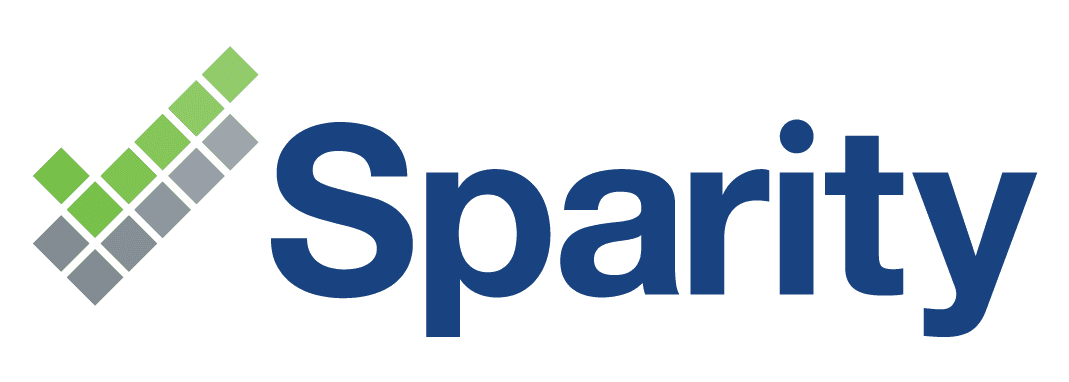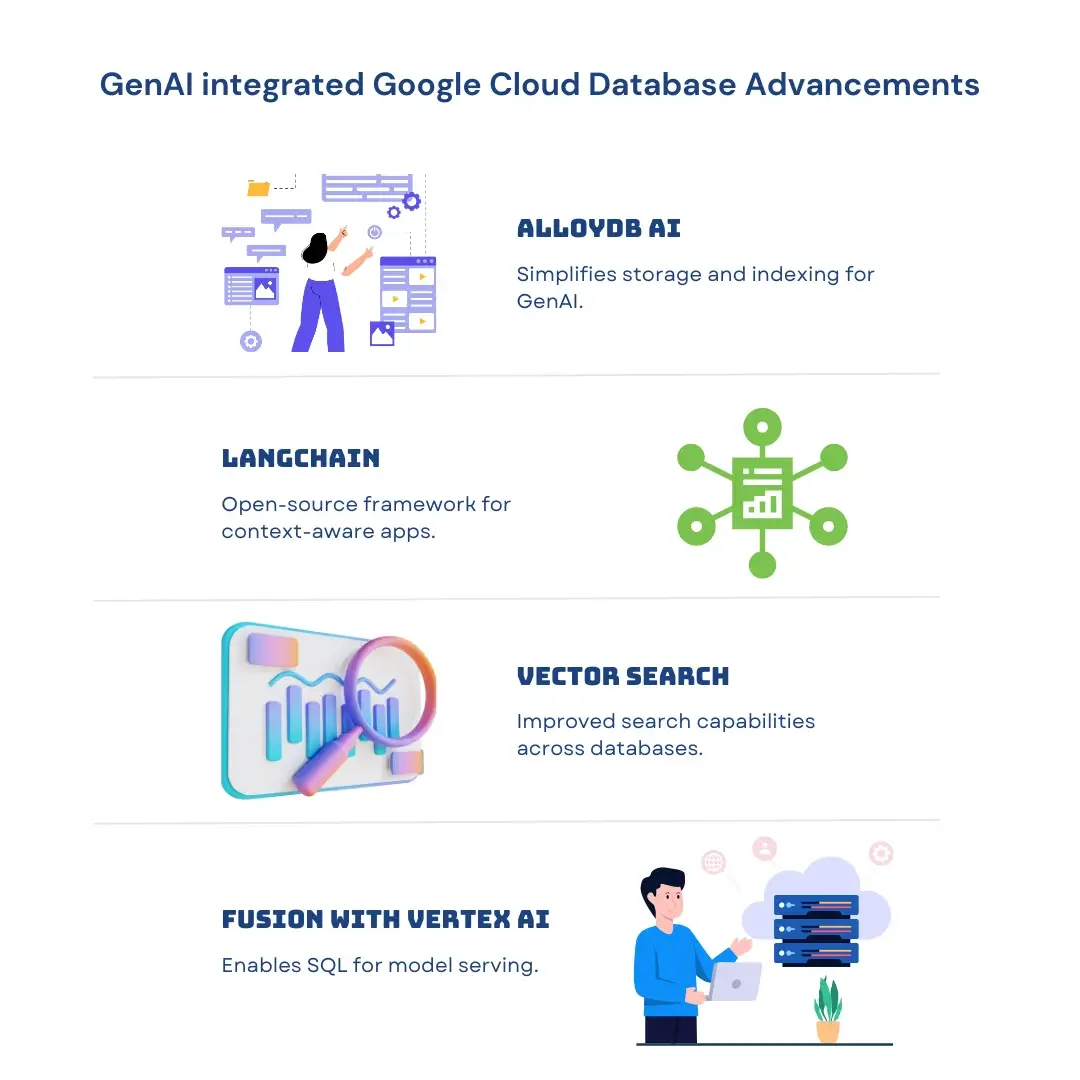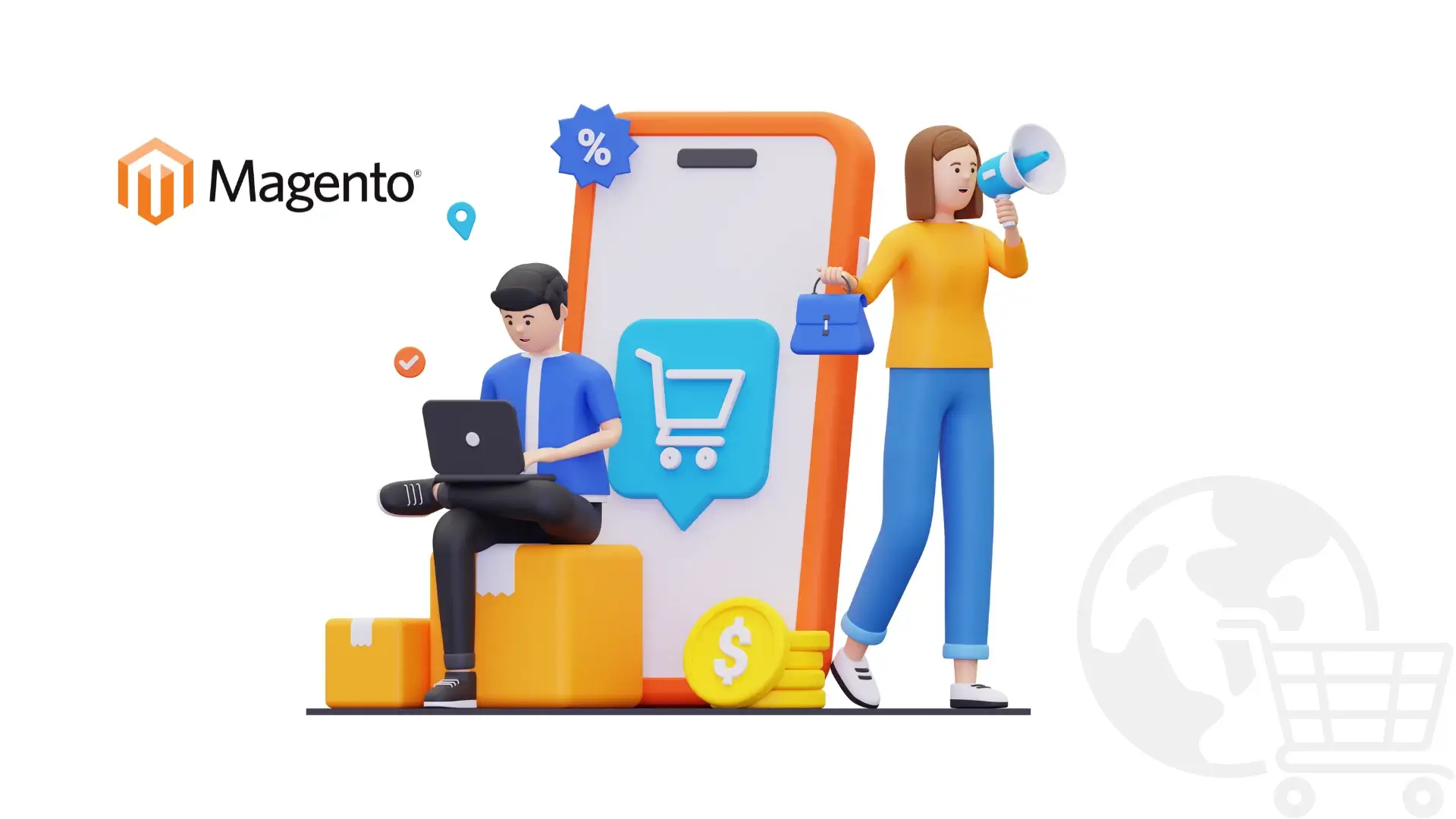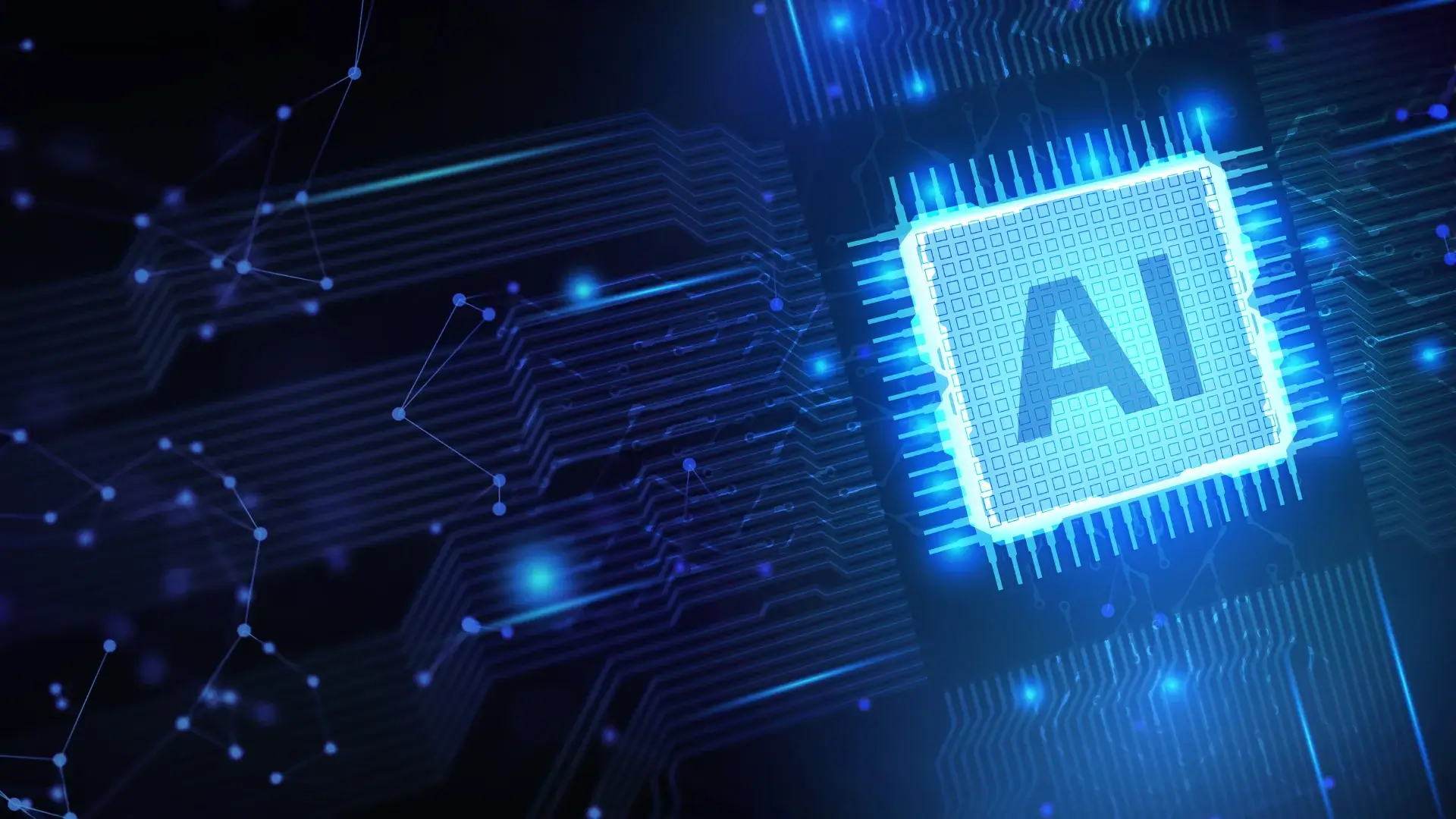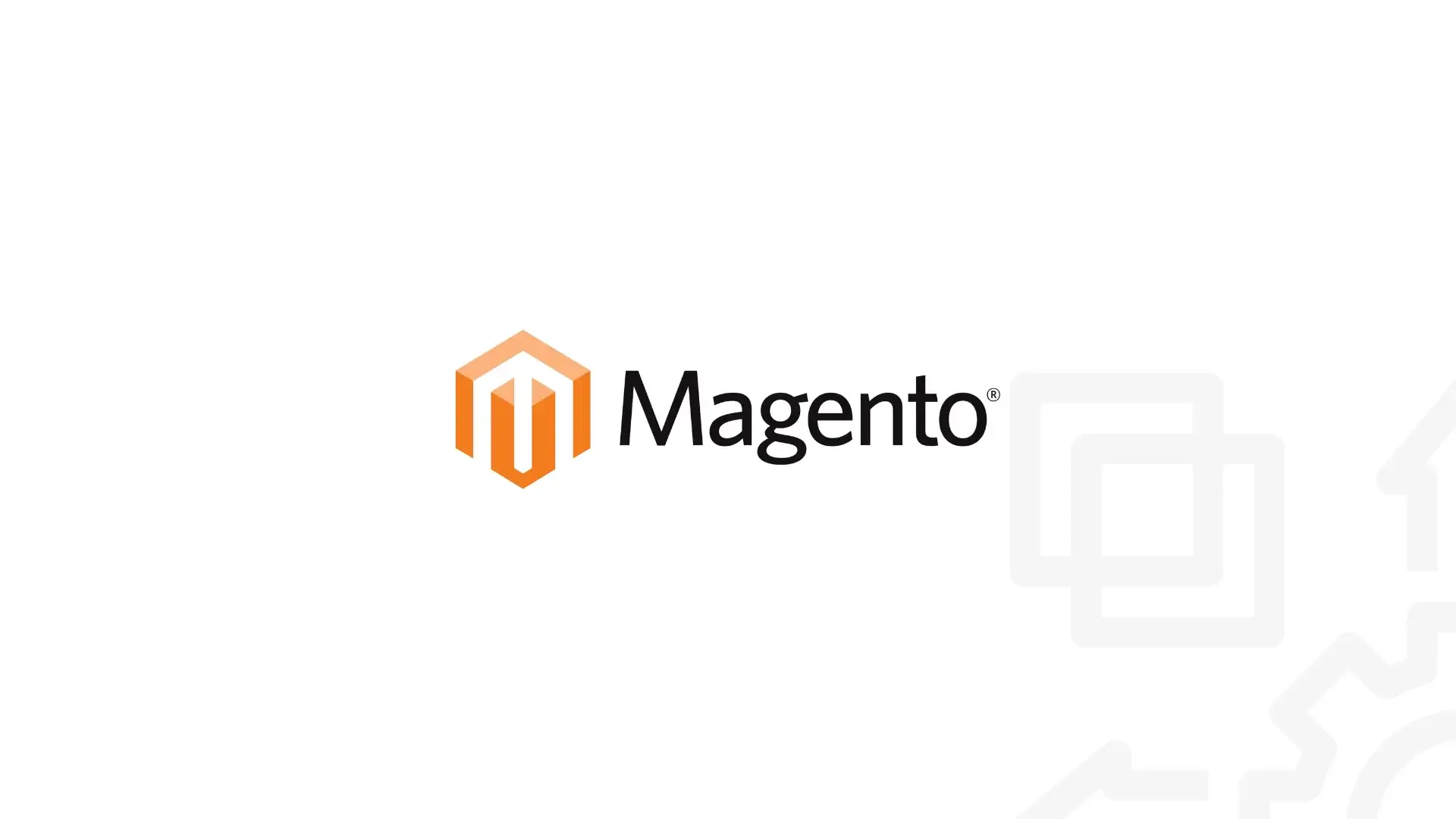Contents
Introduction
The fusion of AI technology with databases has opened up fresh possibilities for innovation and transformation in the tech sector. Google Cloud, a front runner in cloud computing, has spearheaded this evolution by continuously strengthening its offerings to deliver cutting-edge solutions to businesses and software developers. Google has announced significant progress in merging generative AI with its databases, marking a pivotal moment in the advancement of AI-centric applications. Our blog explores into these captivating advancements of google cloud databases and explore their impact on AI-powered products moving ahead.
Google’s prioritization of AI underscores improving database functionalities to effectively back AI-driven applications. As AI advances, the demand rises for databases that seamlessly integrate with generative AI, facilitating development of intelligent, context-aware applications. According to Google, 71% of companies plan to employ databases with built-in GenAI capabilities, emphasizing the crucial role of operational databases in leading enterprise AI advancements moving forward.
AlloyDB
Google’s latest announcement brings a major upgrade to AlloyDB AI, a fully managed database designed for GenAI workloads and compatible with PostgreSQL. Now available in both AlloyDB and AlloyDB Omni, AlloyDB AI offers exceptional performance for transactional, analytical, and vector workloads, making it an ideal choice for enterprise-level tasks. Leveraging the pgvector extension for PostgreSQL, AlloyDB AI enables users to work with vector embeddings essential for developing GenAI applications driven by advanced language models. This integration simplifies storage, indexing, and querying of vector embeddings directly within the AlloyDB ecosystem, enhancing efficiency and effectiveness.
LangChain
Google is enhancing its ecosystem by open-sourcing LangChain integrations for all Google Cloud databases, alongside the expansion of AlloyDB AI. LangChain, an open-source LLM orchestration framework, enables developers to create context-aware GenAI applications with built-in Retrieval Augmented Generation (RAG) workflows. With support for Vector stores, Document loaders, and Chat Messages Memory, developers can seamlessly integrate Google Cloud databases into their workflow, speeding up the development of AI-powered solutions.
Vector Search in Databases
It also extended its google cloud databases offerings with advanced vector search capabilities across various databases like Spanner, MySQL, and Redis. Vector search is crucial for building accurate GenAI-powered applications, allowing developers to find similar results for unstructured data such as text and images. By integrating vector search directly into its databases, Google empowers developers to create GenAI apps with their preferred databases, ensuring performance and scalability are not compromised.
Spanner and AlloyDB with Vertex AI
Integration of Spanner and AlloyDB with Vertex AI, enabling the use of SQL for model serving and inferencing. When Firestore and Bigtable are merged with Vertex AI Vector Search, GenAI apps are equipped with semantic search abilities, ensuring timely, accurate, and contextually appropriate user experiences in business applications. This seamless fusion of operational data with GenAI is critical for fully harnessing the power of AI-driven apps, allowing businesses to provide personalized and smart user interactions on a vast scale.
How google cloud databases advancements helps you ?
Google’s advancements in AI-integrated databases offer a wide array of advantages and benefits for developers, businesses, and users alike. These advancements pave the way for efficient development, enhanced performance, improved search capabilities, easier integration, and personalized user experiences
Efficient GenAI Application Development: AlloyDB AI simplifies the storage, indexing, and querying of vector embeddings, streamlining the development process for context-aware applications.
Enhanced Performance: AlloyDB AI’s exceptional performance for transactional, analytical, and vector workloads is ideal for enterprise-level tasks. Further boosts performance, providing developers with tools to create high-performing GenAI applications.
Open-source Framework: LangChain, empowers developers to create GenAI applications with built-in Retrieval Augmented Generation (RAG) workflows. It supports Vector stores, Document loaders, and Chat Messages Memory, ensuring seamless integration with Google Cloud databases for enhanced flexibility and customization.
Improved Search Capabilities: Integration of advanced vector search capabilities into databases like Spanner, MySQL, and Redis revolutionizes search functionalities. This integration is crucial for building accurate GenAI-powered applications, especially when dealing with unstructured data like text and images.
Easier Integration: LangChain’s integration with Google Cloud databases simplifies the development workflow, enabling developers to accelerate the creation of context-aware applications. This seamless integration streamlines the process, making it easier to leverage AI capabilities within existing systems.
Fusion with Vertex AI: The integration of Spanner and AlloyDB with Vertex AI enables the use of SQL for model serving and inferencing. Additionally, Firestore and Bigtable merging with Vertex AI Vector Search equips applications with semantic search abilities. This fusion ensures timely, accurate, and contextually appropriate user experiences, enhancing the overall user interaction and satisfaction.
Comprehensive Toolset: Developers now have access to a comprehensive toolset comprising AlloyDB AI, LangChain, and Vertex AI. This combination provides a solid foundation for creating intelligent and innovative applications with the the full potential of AI-driven solutions, leading to enhanced products and services.
Competitive Advantage: Improved efficiency, performance, and search capabilities enable businesses to deliver better products and services to their customers. This competitive advantage allows companies to stay ahead of the curve.
Scalability and Reliability: Google cloud databases advancements ensure scalability and reliability for GenAI applications, critical for businesses operating at scale. Integration with Google Cloud’s infrastructure provides a robust environment for growth.
Conclusion
Google’s move towards supporting vector storage in current google cloud databases simplifies the development of enterprise GenAI applications. Coupled with its integration with LangChain, developers now have the necessary tools to effectively utilize AI’s potential. With businesses increasingly adopting AI-driven solutions for competitive advantages, Google cloud databases advancements serve as a solid groundwork for developing the next era of intelligent and innovative applications.
Why Sparity
Sparity’s expertise in AI-integrated databases, coupled with our proficiency positions us as your ideal partner for cloud database services. With Sparity, you can efficiently develop GenAI applications, enhance performance, integrate seamlessly, and gain a competitive advantage in the market. Our focus on scalability and reliability ensures your applications are future-proof and ready for growth. Partner with Sparity for your cloud database needs and unlock the full potential of AI-driven innovation if you are already on google cloud databases.
